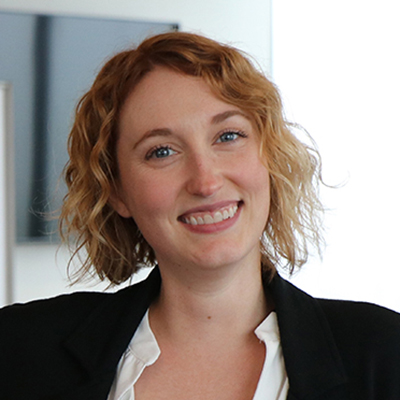BU Law Introduces BU/MIT Student Innovations Law Clinic
Created from the Startup Law and Technology Law Clinics, the newly unified clinic offers a one-stop shop for BU and MIT students engaged in innovative and entrepreneurial activities.

Photo by Dan Watkins for Boston University Photography
BU Law Introduces BU/MIT Student Innovations Law Clinic
Created from the Startup Law and Technology Law Clinics, the newly unified clinic offers a one-stop shop for BU and MIT students engaged in innovative and entrepreneurial activities.
Imagine a BU or MIT student has an idea for an AI platform that helps users hire recent graduates by recommending candidates based on social media content. The student knows they need legal guidance to form an entity, draft early-stage employment agreements, and perhaps to develop an intellectual property strategy for the software they create. But what they may not know is that they also need to consider some big legal issues that aren’t related to launching a new business: Can they acquire social media content in the way they hope to? Are there privacy concerns they haven’t thought of? Might there be antidiscrimination-law concerns in how their algorithm operates? The answers to these questions could fundamentally change the way the student builds their platform, so they need a clear sense of these issues early in the process.
Before this year, the student might have started out by seeking help from the Startup Law Clinic for entity formation, licensing, IP protection, initial financing, etc.—the exciting milestones that new entrepreneurs most often think of when launching a business. It may have only come up later in the process that there were concerns that the Technology Law Clinic, with its focus on third-party IP, business regulation, and privacy and cybersecurity issues, was equipped to tackle.
In response to this overlap in need, Boston University School of Law is introducing the BU/MIT Student Innovations Law Clinic, a unified clinic created from the Entrepreneurship, IP & Cyberlaw Program, which consisted of the Startup Law Clinic and the Technology Law Clinic. Launched in 2015 in partnership with MIT, the program’s two clinics offered legal assistance to BU and MIT students in pursuit of innovative and entrepreneurial activities and provided BU Law students with practice-ready skills in these areas.
“While the two clinics were closely related, it was hard to coordinate across them effectively,” says Andrew Sellars, executive director of the BU/MIT Student Innovations Law Clinic. “A unified program allows us to assess the client’s overall need holistically and more logically approach our work.”
A unified program allows us to assess the client’s overall need holistically and more logically approach our work.
The new structure of the BU/MIT Student Innovations Law Clinic (SILC) borrows from models used by law firms and larger public interest services organizations. Rather than separate clinics offering parallel services, the unified clinic consists of three practice groups: Venture & Finance; Privacy, Security & Health; and Intellectual Property & Media.
Six faculty supervisors will guide up to 40 students as they address client concerns related to each practice group. In addition to serving as executive director of the clinic, Professor Sellars will supervise students in the Privacy, Security & Health practice group, directed by Lecturer & Clinical Instructor Chris Conley. Lecturer & Clinical Instructor Vivian Etter will lead the Venture & Finance group, joined by Lecturer & Clinical Instructor Tom Patten. And Lecturer & Clinical Instructor Jacob Pecht will lead the Intellectual Property & Media group, joined by Lecturer & Clinical Instructor Ari Lipsitz.
BU Law students joining the clinic will have more flexibility in the areas they choose to explore. For example, students who want to pursue IP law can gain experience on both the transactional and litigation sides (whereas before they would have had to choose), and those who want a breadth of experiences related to innovation and entrepreneurship have the opportunity to practice with different groups based on their interest. “We’ve set this up almost as a ‘choose your own adventure,’” Sellars says. “By developing the ability to issue spot across the full scope of client needs, it sets our students up wonderfully for the complex judgment and holistic problem solving they will need to do in professional practice, no matter where they work.”
Meanwhile, the clinic’s clients will get a one-stop shop for all their legal needs. The unified clinic eliminates any potential confusion over where they should go to seek guidance and allows student attorneys and faculty supervisors to spot issues as they come up and collaborate across practice groups to resolve them.
“Bringing these two clinics together has been tremendously exciting,” Sellars says. “We’ve created a very effective legal program—the first in the country built exclusively for undergraduate and graduate students. It is only through that success and growth that we are now able to launch a new and holistic version of what we set out to do. I think in this new model we can push ourselves even further and create an even more enriching educational program for our law students and legal service for our clients.”
